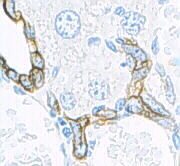Keratin disease
Editor-In-Chief: Prab R Tumpati, MD
Obesity, Sleep & Internal medicine
Founder, WikiMD Wellnesspedia &
W8MD medical weight loss NYC and sleep center NYC
| Keratin disease | |
|---|---|

| |
| Synonyms | N/A |
| Pronounce | N/A |
| Specialty | N/A |
| Symptoms | Skin fragility, blistering, nail dystrophy, hair abnormalities |
| Complications | Infection, scarring, psychosocial impact |
| Onset | Varies by specific condition |
| Duration | Chronic |
| Types | N/A |
| Causes | Genetic mutations in keratin genes |
| Risks | Family history of keratin disorders |
| Diagnosis | Genetic testing, skin biopsy |
| Differential diagnosis | Epidermolysis bullosa, ichthyosis, psoriasis |
| Prevention | N/A |
| Treatment | Symptomatic treatment, gene therapy (experimental) |
| Medication | Topical emollients, retinoids, antibiotics for secondary infections |
| Prognosis | N/A |
| Frequency | Rare, varies by specific condition |
| Deaths | N/A |
Keratin Disease is a group of genetic disorders that affect the keratin proteins in the body. These diseases are characterized by the abnormal structure or function of keratin, leading to a variety of skin and hair conditions.
Overview[edit | edit source]
Keratin is a type of protein that is a key component of the skin, hair, and nails. It provides strength and resilience to these tissues, protecting them from damage. In keratin diseases, mutations in the genes that encode keratin proteins lead to abnormalities in the structure or function of these proteins. This can result in a range of skin and hair conditions, including ichthyosis, epidermolysis bullosa simplex, and pachyonychia congenita.
Types of Keratin Disease[edit | edit source]
There are several types of keratin disease, each associated with mutations in different keratin genes. These include:
- Epidermolysis bullosa simplex (EBS): This is a skin condition characterized by the formation of blisters following minor trauma or friction. It is caused by mutations in the KRT5 or KRT14 genes, which encode keratin 5 and keratin 14, respectively.
- Pachyonychia congenita (PC): This is a condition characterized by thickened nails, painful blisters and calluses on the soles of the feet, and other skin abnormalities. It is caused by mutations in the KRT6A, KRT6B, KRT16, or KRT17 genes.
- Ichthyosis: This is a group of skin disorders characterized by dry, scaly skin. Some forms of ichthyosis are caused by mutations in keratin genes.
Diagnosis and Treatment[edit | edit source]
Diagnosis of keratin diseases typically involves a physical examination, a review of the patient's medical history, and genetic testing to identify mutations in keratin genes. Treatment is usually aimed at managing symptoms and may include the use of moisturizers and keratolytic agents to soften and remove scales, as well as measures to prevent skin trauma and blister formation.
See Also[edit | edit source]
This article is a dermatology stub. You can help WikiMD by expanding it!
Search WikiMD
Ad.Tired of being Overweight? Try W8MD's NYC physician weight loss.
Semaglutide (Ozempic / Wegovy and Tirzepatide (Mounjaro / Zepbound) available. Call 718 946 5500.
Advertise on WikiMD
|
WikiMD's Wellness Encyclopedia |
| Let Food Be Thy Medicine Medicine Thy Food - Hippocrates |
Translate this page: - East Asian
中文,
日本,
한국어,
South Asian
हिन्दी,
தமிழ்,
తెలుగు,
Urdu,
ಕನ್ನಡ,
Southeast Asian
Indonesian,
Vietnamese,
Thai,
မြန်မာဘာသာ,
বাংলা
European
español,
Deutsch,
français,
Greek,
português do Brasil,
polski,
română,
русский,
Nederlands,
norsk,
svenska,
suomi,
Italian
Middle Eastern & African
عربى,
Turkish,
Persian,
Hebrew,
Afrikaans,
isiZulu,
Kiswahili,
Other
Bulgarian,
Hungarian,
Czech,
Swedish,
മലയാളം,
मराठी,
ਪੰਜਾਬੀ,
ગુજરાતી,
Portuguese,
Ukrainian
Medical Disclaimer: WikiMD is not a substitute for professional medical advice. The information on WikiMD is provided as an information resource only, may be incorrect, outdated or misleading, and is not to be used or relied on for any diagnostic or treatment purposes. Please consult your health care provider before making any healthcare decisions or for guidance about a specific medical condition. WikiMD expressly disclaims responsibility, and shall have no liability, for any damages, loss, injury, or liability whatsoever suffered as a result of your reliance on the information contained in this site. By visiting this site you agree to the foregoing terms and conditions, which may from time to time be changed or supplemented by WikiMD. If you do not agree to the foregoing terms and conditions, you should not enter or use this site. See full disclaimer.
Credits:Most images are courtesy of Wikimedia commons, and templates, categories Wikipedia, licensed under CC BY SA or similar.
Contributors: Prab R. Tumpati, MD

